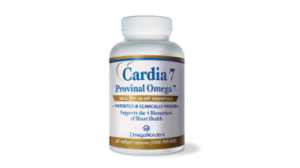Although the omega-3, -6, -7 and -9 category of fatty acids has grown consistently over the past few decades—and the worldwide market for fatty acids will grow from nearly $13.5 billion in 2018 to $17.5 billion by 20231—the public and the dietary supplement industry know the least about the value of the omega-7 fatty acids. This article will explain the value of an extremely well-researched omega-7 fatty acid, palmitoleic acid. https://tersuslifesciences.com/wp-content/uploads/2022/10/2.-Palmitoleic-acid-An-omega-7-fatty-acid-for-inflammation-metabolic-wellness-2.pdf
‘Breakthrough’ Health Supplement Targets Chronic Inflammation and C-Reactive Protein (CRP) Levels
Cardia 7 is a purified Omega 7 supplement that has been clinically shown to reduce C-reactive protein (CRP) levels and chronic inflammation — the best predictor of heart disease
CLEVELAND, OHIO — December 16, 2012 — More than 100 million people in the U.S. who are at risk for heart disease caused by metabolic syndrome and inflammation can now take “Cardia 7”–a purified Omega 7 supplement that has been clinically shown to reduce C-reactive protein (CRP).
The number one killer in the US — heart attacks — is no longer best predicted by cholesterol or triglycerides, but by inflammation which can be measured by C-reactive protein (CRP). It’s estimated that 2,200 people die every day from cardiovascular disease, and half of all heart attack victims who have low cholesterol levels never knew they were at risk.
CRP is a general measure of inflammation in the body and the leading predictor of cardiovascular disease, better than cholesterol and/or triglycerides. For people who have elevated CRP, purified Omega 7 has been clinically shown to reduce CRP by up to 73%. It is also known to decrease insulin resistance, and decrease accumulation of bad fats in the liver — with no side effects.
Chronic inflammation is the best predictor of heart disease and atherosclerosis,” says Michael Roizen, MD, Chief Wellness Officer and Chairman of the Wellness Institute at the Cleveland Clinic.“Chronic inflammation causes swelling and reduction in the diameter of the arteries that can lead to blood clots and accelerate the buildup of plaque and subsequent cardiovascular disease and atherosclerosis. Everyone should get tested to measure their CRP levels, not just to assess risk of heart disease, but there’s new research that shows that elevated levels of C-reactive protein are linked to heart disease, stroke, memory loss, impotence, wrinkling, even Alzheimer’s.”
According to the American Heart Association, people with high CRP are twice as likely to suffer cardiac arrest as those with low levels. “This makes C-reactive protein the most important cardiovascular risk factor we have for men and women over age 50—a more important factor than age, family history, blood pressure, cholesterol, and/or whether you smoke,” says Roizen. “Clearly this merits more trials, and they are already underway.”
The clinical study in humans screened 30 test subjects who took one gel cap per day for a month. On average, taking one gel cap per day, the test lowered LDL cholesterol 11.2%, and for those with elevated baseline inflammation, C-reactive protein was reduced by an average of 73%.
About Michael F. Roizen, MD
Michael F. Roizen, MD, is the Chief Wellness Officer and Chairman of The Wellness Institute at the Cleveland Clinic where he is striving to elevate preventive care and wellness to a driving role in medicine and society by radically improving health and decreasing wellness costs spiritually, physically and economically.
Among Dr. Roizen’s many accomplishments, he co-founded six companies including RealAge sold to Hearst in 2007; co-invented a drug approved by the FDA in April 2008; co-wrote three medical bestsellers and four number one New York Times bestsellers (the YOU series books and RealAge) and formerly served as chair of a Food and Drug Administration advisory committee, as well as editor of six medical journals.
He and Dr. Mehmet Oz co-write the daily “YOU Docs” columns syndicated to 76 newspapers in North America and similar columns in four magazines.
About Cardia 7:
Cardia 7 is manufactured by Tersus Life Sciences. Founded in Cleveland, Ohio in 2010, Tersus was recipient of Therapeutic Discovery Grant for Ground Breaking Medical Research in 2010. Contains Provinal™ Purified Omega 7 fatty acids are purified to express high levels (50% and upwards) of palmitoleic acid (C16:1n7). Future concentrations are projected to be 90% or more. Especially formulated to remove palmitic acid, a saturated fatty acid that has been shown to have toxic effects on pancreatic beta cells (the cells responsible for secreting insulin), leading to a greater chance for insulin resistance and subsequent development of diabetes.
Decoding Diabetes
This is a great article entitled “Decoding Diabetes” by Elizabeth Gudrais from Harvard Magazine.
As you read these words, conditions in your body may feel peaceful. Savor that feeling, because it is a Herculean achievement on nature’s part. We owe this ability to sit reading quietly to a state of internal equilibrium—the technical term is homeostasis. Read more…
‘Healthy Fat’ Chemical Aids Body’s Metabolism
FRIDAY, Sept. 18, 2008 (HealthDay News) — Scientists believe they have discovered a new class of hormones in mice, one of which may help stop or reverse obesity-related conditions such as insulin resistance and fatty liver, a new study says.
The Harvard School of Public Health researchers, whose work was published in the Sept. 19 issue of Cell, said their discovery — if applicable to humans — may allow the development of therapeutic or preventive treatments to counter rising obesity and resulting increases in potentially fatal metabolic disorders such as diabetes and atherosclerosis. [Read more…]
A New Class of Hormone from Healthy Fat Cells Benefits Body Metabolism
Discovery of ‘lipokine’ signaling could eventually lead to new treatments for obesity-related conditions
For immediate release: Thursday, September 18, 2008
Boston, MA — Scientists at the Harvard School of Public Health (HSPH) have identified in mice a newly discovered class of hormones — lipokines, according to a report in the September 19, 2008, issue ofCell. Furthermore, they have implicated a lipokine as a molecule in mice that helps stop or even reverse obesity-related conditions such as insulin resistance and “fatty liver.”
Adipocytes, or fat cells
Lipokines are hormones made from lipids, or fats. All other known hormones — chemical signals secreted into the blood that regulate distant cells and organs — are steroid- or protein-based.

